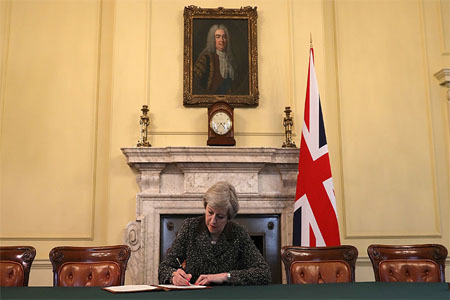
Afrasianet - Brexit day has arrived, with Prime Minister Theresa May expected to initiate the start of Britain’s official departure from the European Union.
The process is kicked off by the triggering of Article 50 of the Lisbon Treaty, with May officially telling Brussels that the UK desires to leave the bloc. The PM has already signed a letter to European Council President Donald Tusk due to be delivered by Britain's permanent representative Tim Barrow on Wednesday.
It's not known exactly when she will pull the trigger, but she is expected to give some kind of statement after the weekly session of Prime Minister's Questions in parliament.
The mood in recent days, however, has been one of congeniality between nations, as the PM said she aimed to keep a “deep and special partnership” with Europe after Brexit.
“I am determined we should also seize this historic opportunity to get out into the world and to shape an even bigger role for a global Britain,” May told businessmen during a Qatari investment forum in Birmingham on Tuesday.
She added this was "one of the most significant moments the UK has faced for many years.”
Her comments were followed by similar wishes from the president of the European Commission, Jean-Claude Juncker, who argued that “the EU will negotiate in a friendly and fair way.”
But not all was well in Westminster on the eve of Brexit day, as a group of Remain-supporting MPs said the government would struggle to meet its own goals and had to be held accountable for any mistakes made during the two-year process.
Meanwhile, the Times deputy political editor Sam Coates shared on Twitter that Tory MPs were being “discouraged from holding Article 50 parties.”
Voters support Brexit either way
Voters, however, continued to support Brexit, whether a deal with the EU is possible or not.
According to a YouGov poll, Britons supported the Labour Party’s“six tests” for a Brexit deal - including trade conditions, workplace rights and “fair management of migration” - but did not see them as the be all end all.
Nearly half of those quizzed thought the guidelines were “reasonable” but less than one third believed Labour should oppose Brexit if the criteria weren’t met.
A separate poll by Ipsos Mori also found that 70 percent of Brits believe the rest of Europe will follow the UK and leave the bloc over the next decade. Opinion was split on whether the end of the EU was a good thing, with 35 percent of Remain voters saying they hoped other nations would leave the bloc.
“While the prime minister has made it clear she wants the EU to flourish without the UK, a large proportion of Leave voters believe, and indeed hope, that other member states will leave the union in the wake of Brexit,” said UK in a Changing Europe think tank director Professor Anand Menon.
Labour’s “six tests” to Brexit
1. Does it ensure a strong and collaborative future relationship with the EU?
2. Does it deliver the "exact same benefits" as we currently have as members of the Single Market and Customs Union?
3. Does it ensure the fair management of migration in the interests of the economy and communities?
4. Does it defend rights and protections and prevent a race to the bottom?
5. Does it protect national security and our capacity to tackle cross-border crime?
6. Does it deliver for all regions and nations of the UK?

